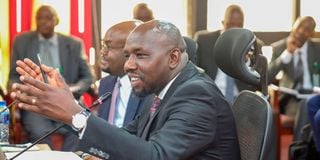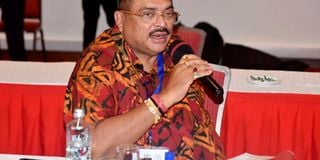Premium
Playing catch-up: Murkomen plans anti-human-trafficking unit

Mr Kipchumba Murkomen, Cabinet Secretary for Interior and National Administration, when he appeared before the National Assembly Committee on Administration and Internal Security at the Bunge Tower Nairobi on Tuesday, April 22, 2025. `
The Kenya government is working on establishing a special unit to deal with cases of human trafficking as well as illegal trade in the human body parts following concerns of an escalation of the social vices.
At a meeting with members of the Administration and Internal Affairs of the National Assembly, Interior Cabinet Secretary Kipchumba Murkomen, while admitting that the rising cases of human trafficking are concerning, he dispelled claims that the government’s move is reactionary.
“It is necessary to have such a unit deal with the vices in the society,” CS Murkomen told the committee chaired by Narok West MP Gabriel Tongoyo adding; “the anti-human trafficking unit will receive intelligence reports and act on them accordingly.”
The body, the CS said, will be similar to the anti-narcotics unit that is in charge of tracking the illegal shipment and trade of banned drugs from the Kenyans market.
It will also borrow from the anti-terror unit that was established to deal with terrorist-related acts on Kenyan soil.
Overseas job recruitment agencies based in Kenya and abroad have been the biggest syndicates of human trafficking- usually of unsuspecting Kenyans innocently seeking for employment opportunities abroad.

The police spokesperson said the suspects will be arraigned.
What is confusing is that while some of the foreign job recruitment agencies based in Kenya have been flagged for illegal dealings in human trafficking, their owners are yet to be charged in court.
Yesterday, CS Murkomen revealed that cases of trafficking Kenyans looking for greener pastures abroad have been “specifically disturbing” as he urged Kenyans with information that will help deal with the vice to come forward and report to the relevant investigative State agencies.
“This body will be critical to confronting the new cases we are facing as a country. It will work with the recruiting agencies to monitor the trends,” the CS told the committee.
According to the Ministry of Labour and Social Protection, trafficking in persons is a global crisis that affects countries of the world and that “anyone can be a victim of this heinous act regardless of age or socio-economic background.”
“Human trafficking has a devastating impact on victims, who are often predisposed to physical and emotional abuse, sexual exploitation, threats against self and family, and even death,” said former Labour and Social Protection Cabinet Secretary Ms Florence Bore during the World Day against trafficking in persons On July 28, 2023.
“It undermines the safety and security of affected nations. Kenya has been described as a country of origin, transit and destination in trafficking in person, with the most prevalent forms of trafficking being labour and sexual exploitation,” the former CS spoke then.
The 2022 study by the National Crime Research Center (NCRC), revealed that human trafficking in Kenya is high.
“The country experienced trafficking for labour and sexual exploitation; and for cultural purposes,” the NCRC report says.
The NCRC report says that trafficking for labour accounted for 96 percent and 98.3 percent of all trafficking cases in the year 2020 and 2021 respectively.
External trafficking
The Study further revealed that external trafficking in persons was the most prominent at 64.7 percent while domestic trafficking was 35.3 percent.
The NCRC report shows that in external trafficking, a majority of the victims were adults and youthful females aged 18-34 years.
“Children were mostly victims of domestic trafficking accounting for four out of 10 victims of domestic trafficking,” the NCRC report states.
The report adds that some of the main factors contributing to trafficking in persons include poverty, unemployment, ready markets for cheap labour and ignorance and impacts of climate change.
According to a 2023 report by the Kenya Blood Transfusion and Transplant Service (KBTTS), an agency under the Ministry of Health, Mediheal Hospital in Eldoret is suspected of being a hub for illicit commercial organ transplants, raising questions about patient safety and regulatory oversight.
The KBTTS document reveals that between November 2018 and 2023, the hospital carried out 372 kidney transplants, an unusually high number by local standards.
This is despite Kenya’s Health Act of 2017 prohibiting any form of organ trade.
While the law allows individuals to donate their organs, this is limited to posthumous donations for transplant, research, or educational purposes and must be done without financial compensation.
The law requires that such donations be made through a written will, where a person, while still alive, specifies which organ may be given and to whom, whether an individual or an institution. Any attempt to profit from organ donation is considered a criminal offence.
Violators face a fine not exceeding Sh10 million, a prison sentence of up to 10 years, or both.
Mediheal hospital is owned by Dr Swarup Mishra, a prominent businessman and former MP for the Kesses constituency, Uasin Gishu.

Mediheal founder Swarup Mishra.
Originally from India, Mr Mishra, was in late 2024 appointed by President William Ruto the chairman of the State-run Kenya BioVax Vaccine Institute.
The KBTTS report also highlighted procedural violations, including cases where consent forms were not translated into languages the donors or recipients could understand despite Kiswahili and English being Kenya’s official languages.
It further found that donors and recipients were frequently not biologically related, in contravention of ethical transplant protocols.
In May 2024, the Kenya Renal Association, a professional body representing kidney health practitioners, called for the immediate suspension of Mediheal Hospital’s operating licence, citing serious ethical breaches. To date, no such action has been taken.
“Transplant commercialization and transplant tourism are illegal,” the Kenya Renal Association said in a statement, accusing the hospital of directly violating World Health Organisation resolutions that explicitly ban the trade of human organs.





